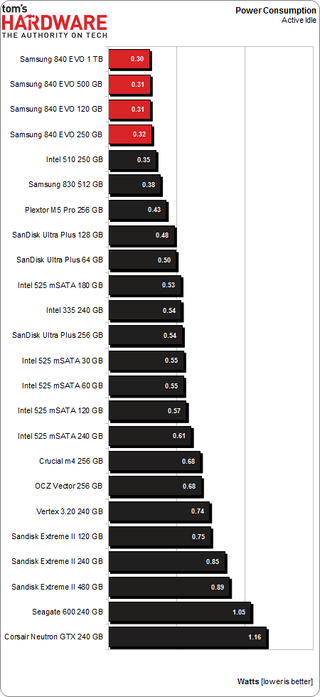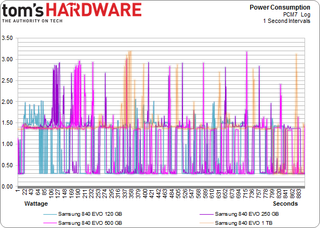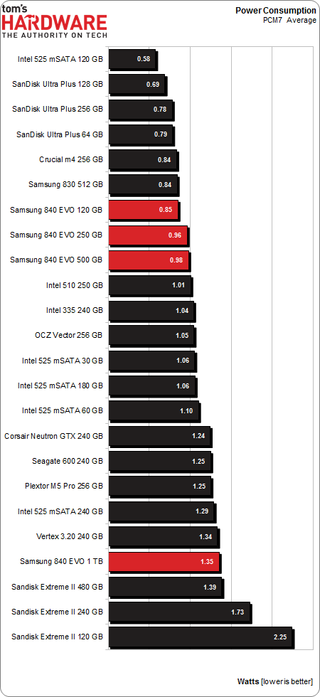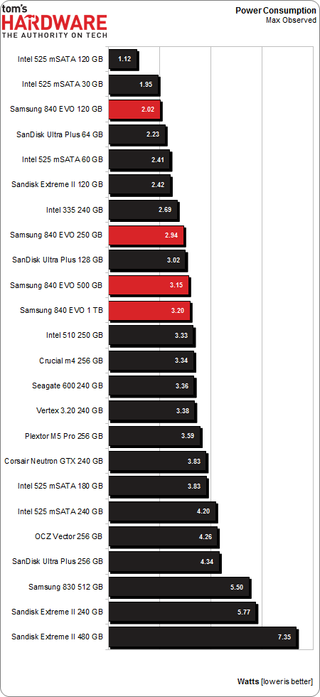Samsung 840 EVO SSD: Tested At 120, 250, 500, And 1000 GB
Last week, Samsung unveiled a successor to its wildly popular 840 at the company's Global SSD Summit in Seoul, South Korea. Stacked with a series of new features and 19 nm, three-bit-per-cell NAND, we benchmark four models and make a recommendation.
Results: Power Consumption
Idle Power Consumption
Idle consumption is the most important power metric for consumer and client SSDs. After all, solid-state drives complete host commands quickly, and then drop back down to idle. Aside from the occasional background garbage collection and house keeping, a modern SSD spends most of its life doing very little. Enterprise-oriented drives are more frequently used at full tilt, making their idle power numbers far less important. But this just isn't the case on the desktop, where the demands of client and consumer computing leave most SSDs sitting on their hands for long stretches of time.

The EVO's MEX controller pulls active idle consumption even lower, dropping to under one third of a watt.
PCMark 7 Average Power Consumption
If we log power consumption through a workload, even a relatively heavy one, we see that average use is still pretty close to the idle numbers. Max power may spike fiercely, but the usage seen during a PCMark 7 run is pretty light.

During the run, each tested drive drops from peak to idle over and over again. Often, those peaks correspond to drive capacity; the more flash in a given SSD, the higher we see power consumption reach.

Averaging out power use during a PCMark run can give us a more accurate look at what a moderate desktop workload looks like with regard to power. Again, we observed higher-capacity drives consuming more power during a run, while smaller SSDs rise to the top.
Stay on the Cutting Edge
Join the experts who read Tom's Hardware for the inside track on enthusiast PC tech news — and have for over 25 years. We'll send breaking news and in-depth reviews of CPUs, GPUs, AI, maker hardware and more straight to your inbox.
Maximum Observed Power Consumption
There isn't much to say about maximum observed power consumption. It doesn't warrant a lot of explanation, aside from the fact that few client workloads trigger these levels of use. It's a much more important metric in enterprise applications, where maximum consumption is a critical variable in total cost of ownership.

Periods of high power use happen occasionally, but only briefly. Idle power figures are more representative when it comes to picking an SSD that's going to help extend your notebook's battery life, though maximum numbers that reach too high are worrisome as well.
The 840 EVO has a throttling mechanism to keep temperatures and drive health in check during the most taxing, heat-intensive situations, though we wouldn't recommend testing those boundaries.
Current page: Results: Power Consumption
Prev Page Results: Robocopy File Copy Performance Next Page A Look At Samsung Magician's RAPID Feature-
Someone Somewhere Surely it would make sense to compare it to the vanilla SSD840. Also, there's no 840 Pro in the power charts.Reply
While the 1TB drive coming down to ~65c/GB is nice, seeing the 120 GB drives get near there would be nice. Especially since this is meant to be the value king. -
drwho1 I have 2 840 pro 512 GB SSD's (1 on my notebook 1 on my PC)Reply
I got them on a sale on Newegg for around $500 for both of them. :)
A 1TB would be cool if I find it on sale....
or maybe I should try out writing a letter to someone fat in some weird red costume...
-
slomo4sho The performance gap between the 840 Evo and 840 Pro is discouraging for the lower capacity models. I understand that the Pro is the flagship product but I was expecting less of a gap in in the 120GB models since this is a newer generation product and the 840 Pro is still based on the 21nm MLC NAND. However, the 1TB model is is a great choice for mass SSD storage. Lets hope the prices drop below $0.50 per GB soon.Reply -
Someone Somewhere MLC is faster than TLC, and bigger node NAND is usually faster. Only reason to go smaller is price and power.Reply -
SteelCity1981 I wonder if samsung plans on releasing a pro evo series since the regular series evo is to replace the older non pro versions.Reply -
razor512 ripoff, high prices for triple level flash especially at 19mm, the lifespan will likely suck and their shortened warranty represents that.Reply -
master9716 Cost for performance = Very High . ofcourse its not going to perform like a Pro but for the cost im amazed its that much better than the Regular 840.Reply -
J_E_D_70 Glad this review also refutes the perception of low TLC write endurance in normal desktop workloads. Been using a 128GB 840 in a daily-use desktop for eight months now and the endurance counter hasn't decremented at all. I'll have replaced the entire rig long before it wears out.Reply -
JohnnyLucky Interesting review. I think the point to remember is that the 840 EVO is not a high end enthusiast ssd like the 840 Pro. Instead, consider the 840 EVO as a mainstream ssd suitable for most consumer and home office scenarios.Reply
Most Popular

